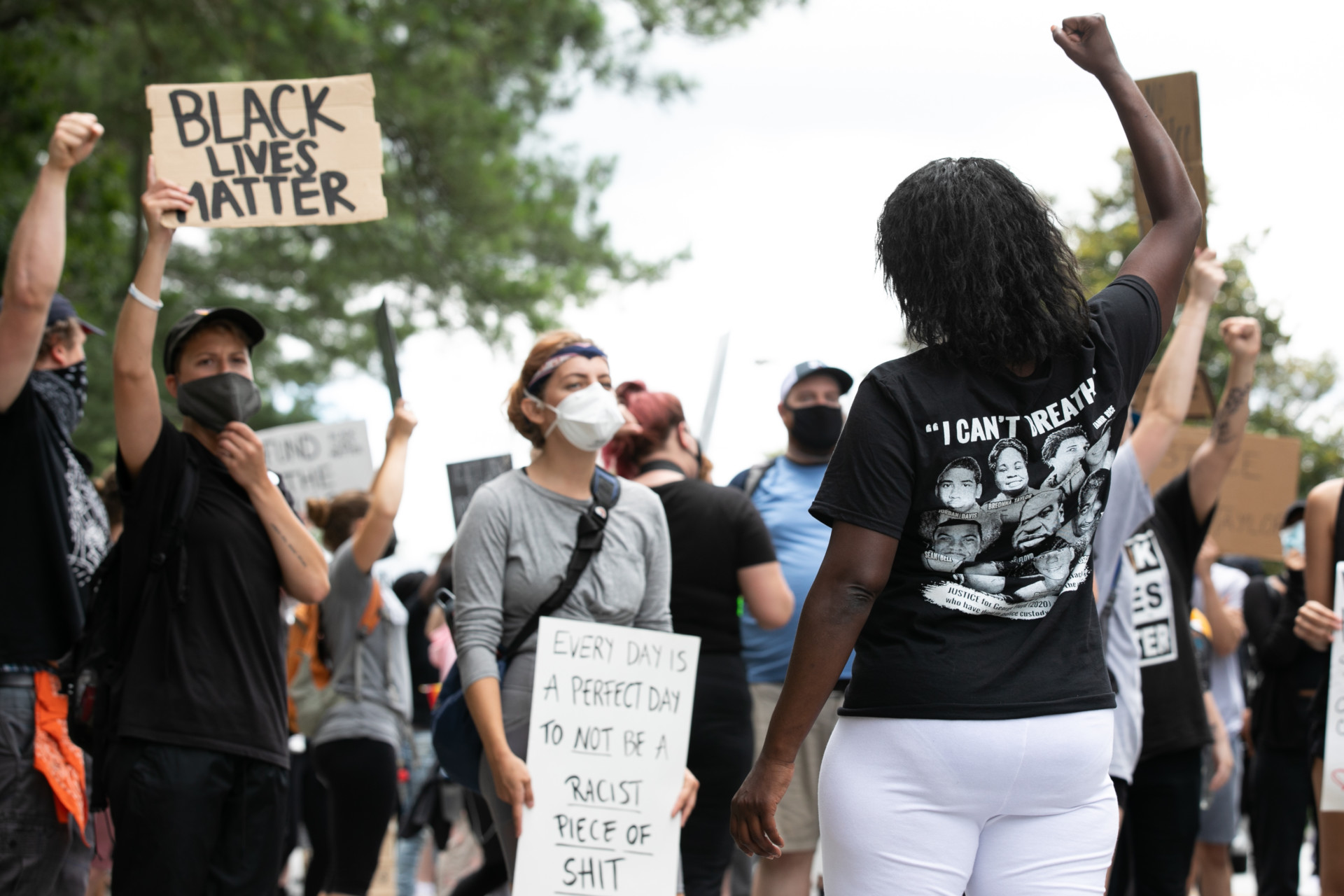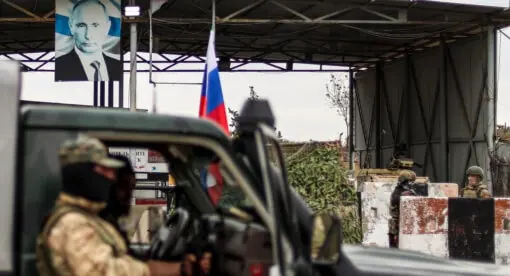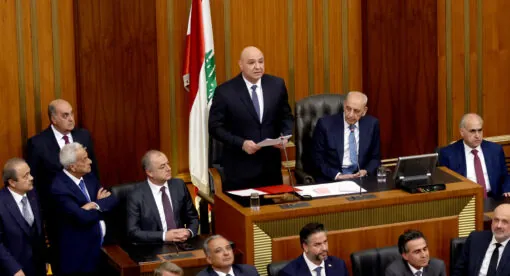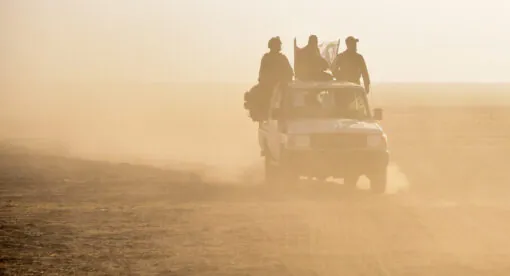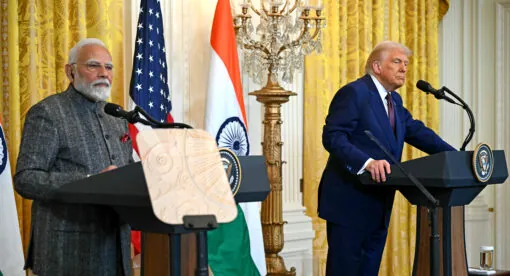In order to make meaningful changes to American policing, governments at the local, state and federal levels must confront a system that has been built on and sustained by systemic racism.
The police killing of George Floyd on May 25 in Minneapolis has sparked protests that are likely to continue until federal, state, and local governments make sincere moves to overhaul the U.S. policing system. The racist ideals at the heart of the American policing model are being confronted in a watershed moment. The implementation of reform has been attempted for decades, with little meaningful change — the system goes directly against American ideals of civil rights. Faith in American institutions is waning as we confront a global pandemic, upcoming elections, and now a deep-rooted fear of institutions intended to uphold justice. The federal government needs to engage in a national-scale undertaking to root out racism in American government and society so we can finally address matters that have remained unresolved since the passage of the 1964 Civil Rights Act.
The reverberations of Officer Derek Chauvin’s actions have been seen around the world, and it is clear that the current system of policing must be reformed, at the very least. Systemic racism has always existed in the United States, and by moving away from the militarization of the police, the United States has an opportunity to rethink the way law enforcement approaches the communities that it aims to protect and serve.
The History of American Policing
The police system, as it exists in America, was founded on principles of racial inequality and the treatment of slaves. Slave patrols in the antebellum period were part of the foundation on which policing in the South was formed. Prior to the Civil War, these patrols, made up of white men who did not own land, served “(1) to chase down, apprehend, and return to their owners, runaway slaves; (2) to provide a form of organized terror to deter slave revolts; and, (3) to maintain a form of discipline for slave-workers who were subject to summary justice, outside the law,” according to Dr. Gary Potter of Eastern Kentucky University’s School of Justice Studies. After the war, there was a significant shortage of labor in the South, which had previously been dependent on slavery. As such, newly freed Black Americans were arrested and sent to prison for minor crimes such as vagrancy and loitering. Because of a loophole in the 13th Amendment to the U.S. Constitution, prisoners could be used as forced labor, thereby creating a system of slavery by another name: the prison industrial complex. Businesses have used cheaper prison labor to produce their goods for decades, giving them incentive to lobby for actions that create new prisons, which then need to be filled.
Over time, policing evolved into a less overtly racist system, but it still enshrines the myths and stereotypes of violent Black men. This began with societal fears being stoked through early media depictions of Black men as rapacious criminals, priming white citizens to be hyper-aware of the (often imagined) threat they posed, leading them to report Black men to the police at far higher rates than others. Throughout history, vigilante justice carried out by the police or by mobs of angry racists has acted on false accusations and incomplete information. There is ample evidence to show that the police unfairly target Black populations by subjecting them to unjust and racial profiling.
Today, there is not enough incentive for police to not kill unarmed men who have historically been portrayed as criminals — the officers involved return to work and their cases are glossed over. Police officers receive little training on conflict de-escalation and implicit bias; calls for reforming these trainings have not led to a significant change in the number of Black Americans killed by the police. Chauvin had numerous use-of-force complaints against him, yet he was on active duty. The protection of police jobs, largely through qualified immunity, creates a cycle in which officers do not learn from their mistakes. In other professions, a fatal act often leads to losing one’s job; the same should be true for police.
Demands for Change
Demands for defunding the police are being heard in Congress and in state and local governments. The Minneapolis City Council has announced that it will begin to dismantle its police department, surprising even the activists that were calling for this action. Defunding the police has been a demand of movements around the country, but at its core, this demand calls for the reallocation of funds away from combative and reactive officer training and towards unarmed mediators who can de escalate conflicts without using violence. Members of both chambers of Congress have begun drafting legislation regarding police use of force, but reforming use-of-force laws is a toothless tactic — previous such attempts at reform have not worked because they are attempting to change a system from the inside, when the very basis of the system is racist.
Reimagining police forces in a more proactive and community-based role is not only a step towards reducing harmful racial tensions between police and the communities they serve but also an opportunity to rethink how Americans value the lives of their fellow citizens. A new system that relies more on community building and social safety nets would create room for the police to perform their jobs in stopping crime without them also having to act as a community’s only social service. In most suburbs, this is already a reality: Schools have social workers, hospitals have increased mental health resources, and the police have far less of a presence in spaces made for learning and healing. In the policing realm, a reasonable place to start would be with unarmed first responders arriving at emergency calls, a move that San Francisco has recently adopted.
Policy Recommendations
Policy reforms need to address that policing is a profession, not an identity. Using the slogan “Blue Lives Matter” as a counterpoint to “Black Lives Matter” fails to recognize that “Blue” lives do not exist. Entering the police force is a professional choice; there is no choosing to be Black. As such, reforms need to address the reality of being Black in America rather than trying to reform policing systems.
One way to prevent future fatalities is to remove military-grade equipment from local police forces, who have no need for such weapons. For example, meeting protesters on equal footing — rather than bringing out tanks to quell protests — is a basic first step that avoids escalation. Additionally, U.S. police forces need to stop receiving training from foreign militaries. This only serves to create a combative dynamic between police and their communities — armies are trained to fight wars, not to keep a locality safe. The increasing force only furthers the chasm between local law enforcement and the communities they protect and serve. In order for reforms to be effective, policing needs to be rethought in light of modern race relations. The United States would do well to move away from the militarized police forces of large cities and adopt a community model that has been proven to work in more-affluent areas. Countries with less militarized and armed police forces have far lower rates of officer-involved violence.
Businesses are major stakeholders in the system that allows for the continual abuse and imprisonment of Black Americans. Companies need to divest from relying on prisoner labor and move away from lobbying efforts to create and build new prisons that allow them to continue profiting off this abusive practice. Policymakers should work to repeal strict laws about policing and sentencing that create the pipeline that allows for minor crimes to be prosecuted to the fullest extent, thereby placing people in prisons for longer amounts of time. The 13th Amendment should be amended to remove the loophole that has allowed for the policing system to become one of profit, recklessness, and unaccountability. The United States needs to stop viewing prisons as a holding cell for people who it deems are unfit to be part of society — we need to look at policing as a proactive, rehabilitative process, not the current system that results in deaths from hasty reactions.
Minna Jaffery is the Content Manager at the Newlines Institute. Jaffery’s research focuses on South Asia-Persian Gulf relations, terrorism and ideology, and US national security. She graduated with her MA in Middle Eastern, South Asian, and African Studies from Columbia University, and obtained her BA in Near Eastern Languages and Civilizations and English from the University of Chicago. Previously, she worked at the Center for American Progress and the Tow Center for Digital Journalism.
The views expressed in this article are those of the author and not an official policy or position of the Newlines Institute.

